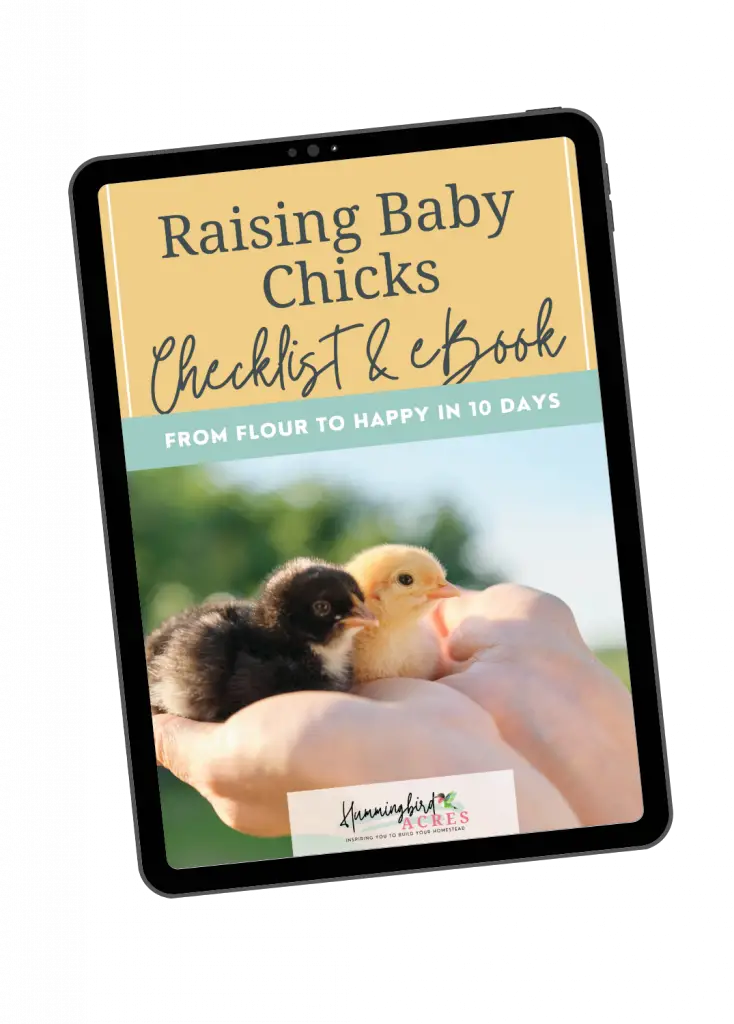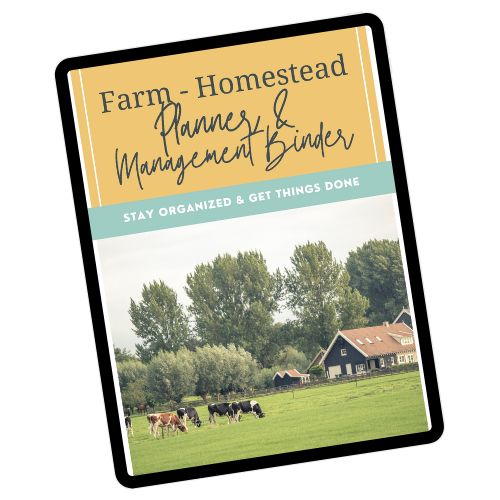Raising Chickens for Beginners
So you are thinking about adding animals to your farm or homestead. Well raising chickens is a great place to start!! They are easy to care for, fairly inexpensive, and rewarding. But before you place that order for baby chicks, are you ready for the commitment? Are you ready to act as mother hen for a few weeks and give them the attention they need? If you are committed, keep reading to learn the basics of raising chickens for beginners.
Disclosure: Some of the links below are affiliate links, meaning, at no additional cost to you, I will earn a commission if you click through and make a purchase.
Why Should You Raise Chickens?
There are many pros to raising chickens such as fresher and tastier eggs that are better for baking. The shells and the chicken poop can be tossed into the compost pile. Much of the day, the birds entertain themselves, picking at grass, worms, beetles, and all of the good things that go into making those yummy eggs.
Things to Consider Before Getting Chickens…
- Check local town ordinances to ensure that keeping chickens is even allowed in your neighborhood or if there is a limit to the number of chickens you can keep at once. The last thing you want is to invest time and money into preparing for chickens and then find out that you can’t even keep them!
- Make sure you have the space for a henhouse or a full-size chicken coop. It has to hold a feeder and water containers, a roosting area, and a nest box for every three hens. A proper coop should be large enough that you can stand in it to gather eggs and shovel manure comfortably, but a simple henhouse can be quite a bit smaller. Plus, any housing must be sturdy enough to keep your chickens safe from all the predators out there! Here’s how to build a chicken coop in your backyard.
- Chickens need food (and water) daily. Feed is about $20 per 50-pound, but prices vary depending on your location and the quality of the feed. How long a bag lasts depends on the number of chickens that you have.
- Hens will lay eggs through spring and summer and into the fall, as long as they have 12 to 14 hours of daylight. Expect to collect eggs daily, or even twice a day.
- You will have to shovel manure and clean the coop all year long.
- If you go away on vacation, you’ll need a reliable chicken-sitter

Grab my free Checklist
Raising Baby Chicks
Enter your name and email and we will send you our FREE guide.
If you are still interested in Raising Chickens for Beginners, keep reading to learn how to house them, the best breed to pick, the supplies you will need, and so much more.

How many Chickens Should I Get?
Just like humans, chickens are sociable creatures, so plan to keep three to six birds at a time. With this amount, you’ll always have a steady supply of eggs. An adult hen lays about two eggs every three days, on average.
Chickens are most productive in the first two years of their lives. After that, egg production will slow, so you’ll need to consider replacing your flock with younger birds. Young chicks can be bought from suppliers quite easily, or you can hatch your own if you have a rooster.
How Much Space Do Chickens Need?
The amount of space your chickens needs depends on the breed of chicken you’re raising. According to the University of Missouri Extension, one medium sized chicken needs at least 3 square feet of floor space inside the coop and 8 – 10 square feet outside. The more space, the happier and healthier the chickens will be. Overcrowding can cause disease and feather picking.
Chickens need a place to spread their wings, a sizable chicken run or a backyard. Either way, the space must be fenced in order to keep the chickens in and predators out. Chicken-wire fencing is a must! Hens like outdoor time so they can take a dust bath and soak in the warm sunshine.
How Much Does Keeping Chickens Cost?
Just like everything else raising chickens costs money. The materials to build and furnish a coop and a run -including wood, fencing, and hardware- are going to cost you at least $300. If you don’t build your coop/run yourself you will also be paying for labor. Know that if you buy a coop kit say from Amazon or Tractor supply you could also pay a little bit more.
Overall, expect to spend between $500 and $700 when just getting started, depending on the size of your flock, coop, and run.
Pick Your Housing Arrangement
If you are still with me and want to raise chicken then lets talk about housing. Will you let your chickens roam your yard or are you going to keep them confined in a coop/run? Your space limitations will determine this for you. If you live in an urban or suburban setting, you probably want to keep your chickens in a confined area with a fenced run outside their coop for fresh air and sunshine.
Chickens will eat and scratch in flowers and garden plants, so you will need to be careful if you let your chickens free range. If you want them to eat fresh grass and have room to roam but want to protect your crops and garden, you can build or buy a chicken tractor. Then every few days, depending on how many hens and how much space you have, you can move the chicken tractor to fresh ground.
Ongoing chicken care is easy. Feeding, watering, gathering eggs, and periodically cleaning bedding are the main tasks. The key is to be sure you keep a regular schedule since hens cannot go very long without water.
A Coop & Chicken Supplies
When it comes to chicken coops your options are endless. They can be small and simple, or massive and complex. They can be purchased or pre-made or built yourself. You just need to make sure that your coop is adequate size, has protections from predators, roosting poles, adequate ventilation and nesting boxes.
There are a few extra things you will need for pullets (young hens) once they’re out of the baby chick phase such as waterers, feeders, bedding/litter, feed, scratch and grit. Remember that many of these items can be made from things you already have.

Choose the Best Breed for You
There are so many different varieties of chickens and so many different things to consider when determining the best breed for your flock. Here are some things to consider when picking your breed; climate, breed temperaments, egg production levels, and whether you want a “dual-purpose” bird that is good for eggs and meat or purely an egg producer. There are some breeds that work out better for a smaller farm or homestead.
You can combine multiple breeds in one flock. They will get along whether you have one breed or seven, all flocks establish a pecking order. If you’re planning to breed your flock and you want purity, you’ll want to stick with a single breed or house each breed separately.
Raising Baby Chicks
Caring for baby chicks can be very time intensive and fun those first couple of weeks.
To make sure you are prepared collect ALL the supplies you need before your chicks arrive. You will need to keep them under a heat lamp, monitor their temperature, and make sure they have enough food and water. Each week, you will lower the temperature until they are comfortable with outdoor temperatures. Once they are acclimated, you can remove the heat lamp and move them to the main coop. If raising chicks sounds like too much work you can purchase starter pullets which are a little older.

Do You Need a Rooster?
If you plan on hatching your own chicks, then yes, you will need a rooster. But, if you only want to keep chickens for egg production, then no, you will not need one. Hens can produce eggs without a rooster.
Roosters are feisty. As such, they are good flock protectors. If you need another level of flock protection, a rooster might provide just the level of predator protection you need.
There you have it. Raising Chickens for Beginners, but don’t be fooled, there are so many other things you need to know. Be sure to check out my other post on chickens to make sure you are keeping your flock happy and healthy.

You may also enjoy these related articles:
- What Time of Day do Chickens Lay Eggs?
- Best Dual Purpose Chicken Breeds for Meat and Eggs: A Comprehensive Guide
- Best Chicken Breeds for Kids
Did you enjoy this article? Want to hear more? Stay in touch! Sign up below to receive weekly tips and inspiration for your homestead.

Grab Our
Homestead Management Binder
Everything you need to keep track of your homestead.

